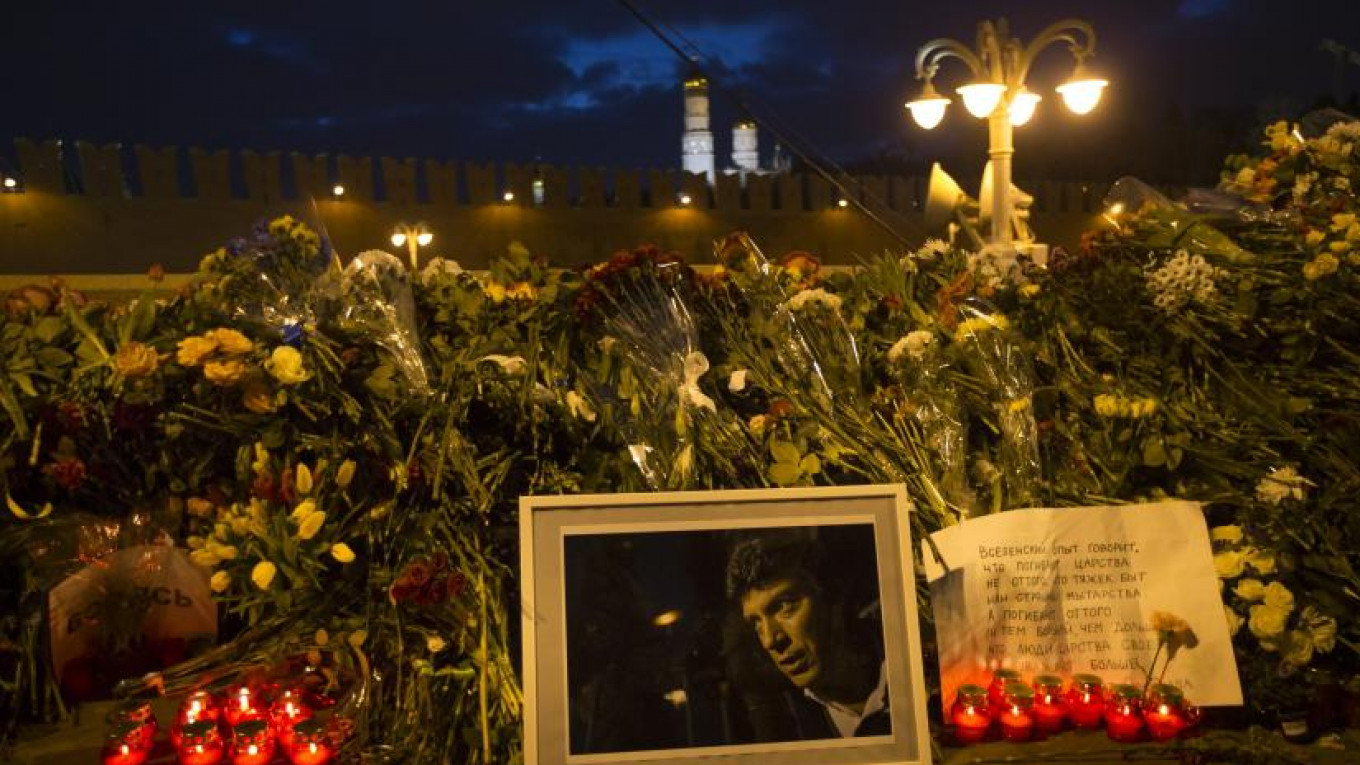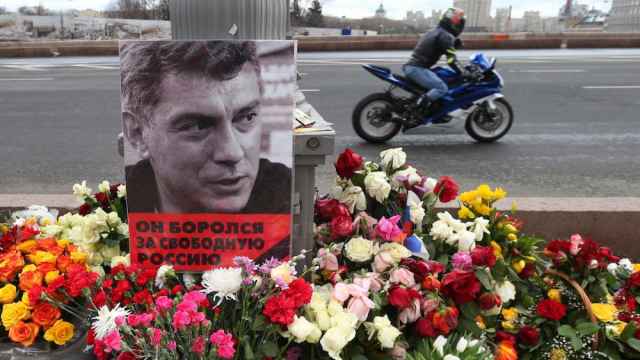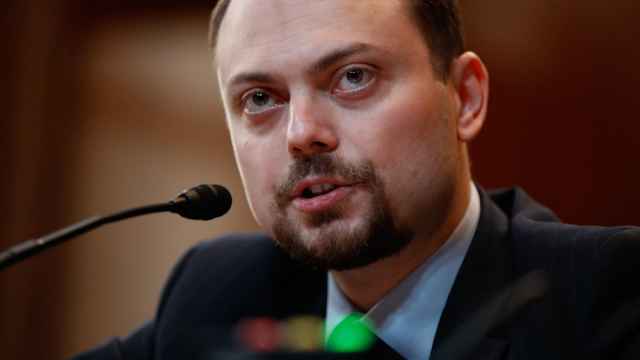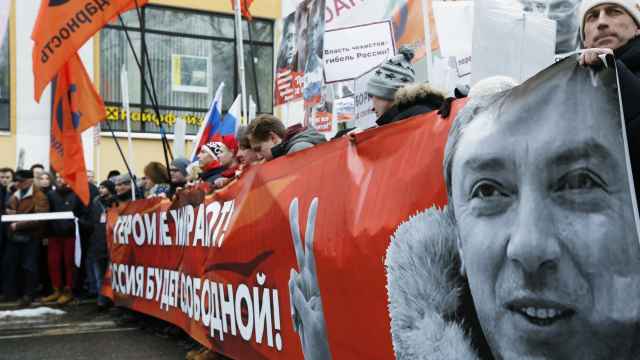Darkness falls with the threat of violence on the Bolshoi Moskvoretsky Bridge. It’s here, under the shadow of the Kremlin, the epicenter of Russian political power, that law enforcement, activists and agents provocateurs come together in the small hours of the morning.
They meet at the spot — the short incline in the bridge — where Boris Nemtsov was gunned down two years ago this week.
Remarkably, city authorities have denied requests to install a permanent plaque to the former deputy prime minister. Instead, in its place is a makeshift shrine, protected every day and every night by a group of two dozen activists.
They believe it is the only way to keep alive the memory of a man once touted as the successor to President Boris Yeltsin.
Cat and Mouse
The place where Nemtsov took four bullets to the back is inhospitable even in good weather. Strong winds from the Moscow River swirl incessantly. Cars race along the six-lane highway at breakneck speed.
At 6 a.m. on a dark, February morning, the air is bone-chilling. But Lyubov Sergeyeva, a volunteer whose shift began at 11p.m. the night before, shows no sign of fatigue. “Imagine how it was in winter when temperatures fell below 20 C,” her companion, Viktor Kogan, says.
Together with the other “Nemtsov Bridge” watchmen, Sergeyeva and Kogan have endured a campaign of harassment and intimidation. The worst of it, they say, unfolds under the cover of darkness. Those volunteers who take over from the night shift always ask the same question: Was there any trouble?
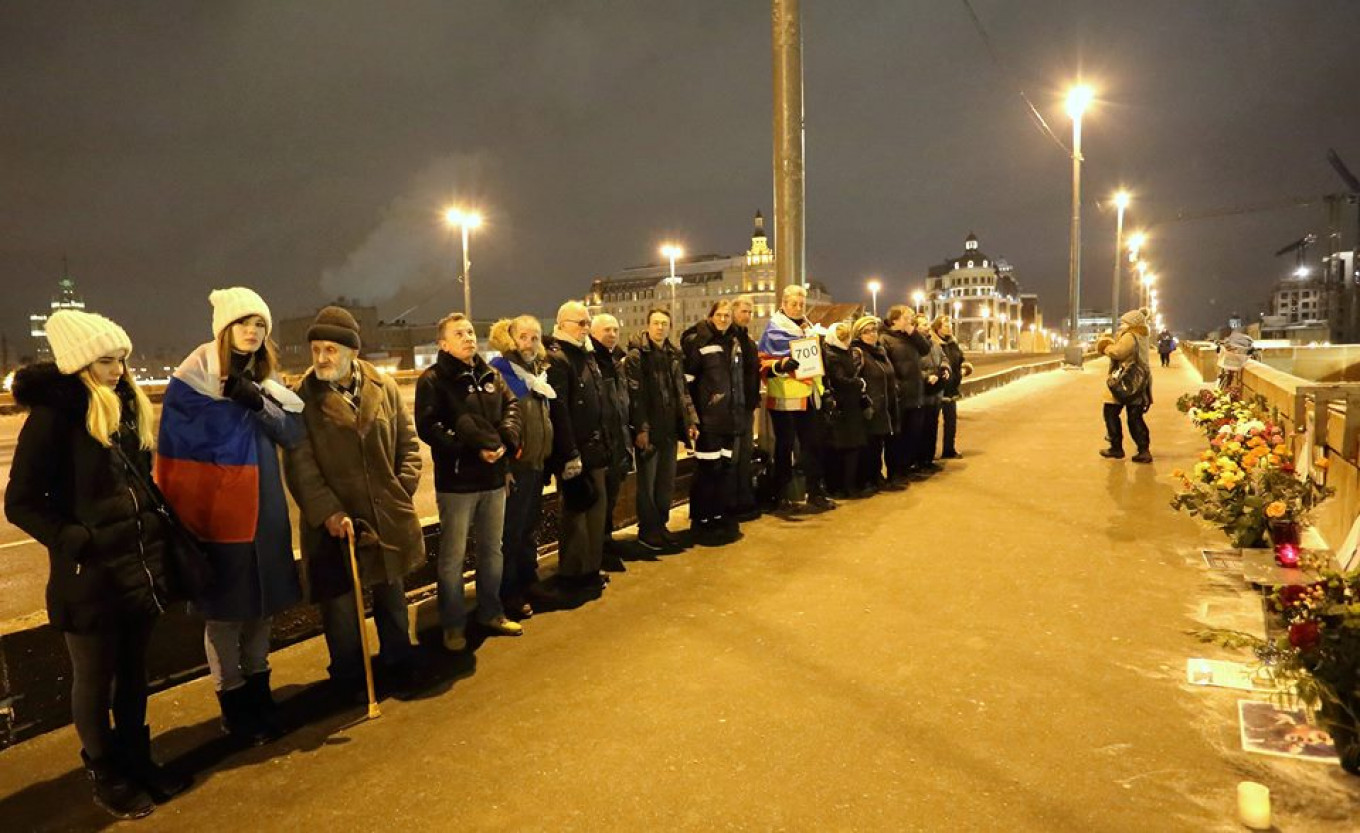
Some nights, police pull up to the makeshift memorial in response to an “emergency callout.” On others, they come to disrupt what they say is an “unsanctioned public meeting,” or to resolve “obstruction of free movement” along the bridge.
Whatever the reason police give, the result is the same: the volunteers are escorted away or told to leave the bridge to allow municipal cleaners to “clean” it. When the activists return, their commemorative flowers, signs and photos have vanished.
Ahead of the two-year anniversary of Nemtsov's killing on Feb. 27, these clearings have increased in number and intensity. There have been at least ten sweeps since the beginning of the year, the volunteers say. And every night brings the risk of another.
The fact that the volunteers have not suffered serious repressions at the hands of law enforcement suggests the campaign is being coordinated only at a local level. “If Putin or his staff wanted to, they would get rid of us in two seconds,” says Andrei Margulyov, who works as a courier during the daytime.
The volunteers have devised a strategy to protect the memorial during the night. At the end of every day, they hide the expensive bouquets, leaving only a portrait of Nemtsov and a sheet of paper marking the days since his death. Once the sun comes out, the volunteers restore the memorial in full.
The watchmen have also begun to document disturbances with pocket-size cameras and keep a detailed log online. “The authorities fear public disclosure,” Margulyov says.
City Hall declined to respond to The Moscow Times’ requests for comment.
“You should be hanged from a lamp post”
Boris Fyodorovich, a former construction worker and now a pensioner of 73, has an endless stash of jokes. But the laughter stops dead when he recounts the last time he was assaulted by what he describes as “agents provocateurs.”
Fyodorovich was alone that night, three hours into the night shift, when three young men walked up.
“They started calling Nemtsov names and trampling on the flowers,” he says. “One picked up his portrait and threw it down the road.”
The activist tried to call for help, but one of the assailants grabbed his phone. Luckily, another activist appeared just in time, and chased the assailants away.
The watchmen say they are regularly threatened verbally. Some threaten to push them off the bridge; others to “hang them from lamp posts.” One man urinated on Nemtsov's photograph.
It is unclear whether the attacks are spontaneous or orchestrated. But Fyodorovich says he believes the attacks are a symptom of the same polarization of society that led to Nemtsov's murder.
“There's a war going on and we're in the line of fire,” says Fyodorovich. He sighs before reaching for his trouser pocket and pulling out a strip of white pills.
“They’re for my heart,” he says.
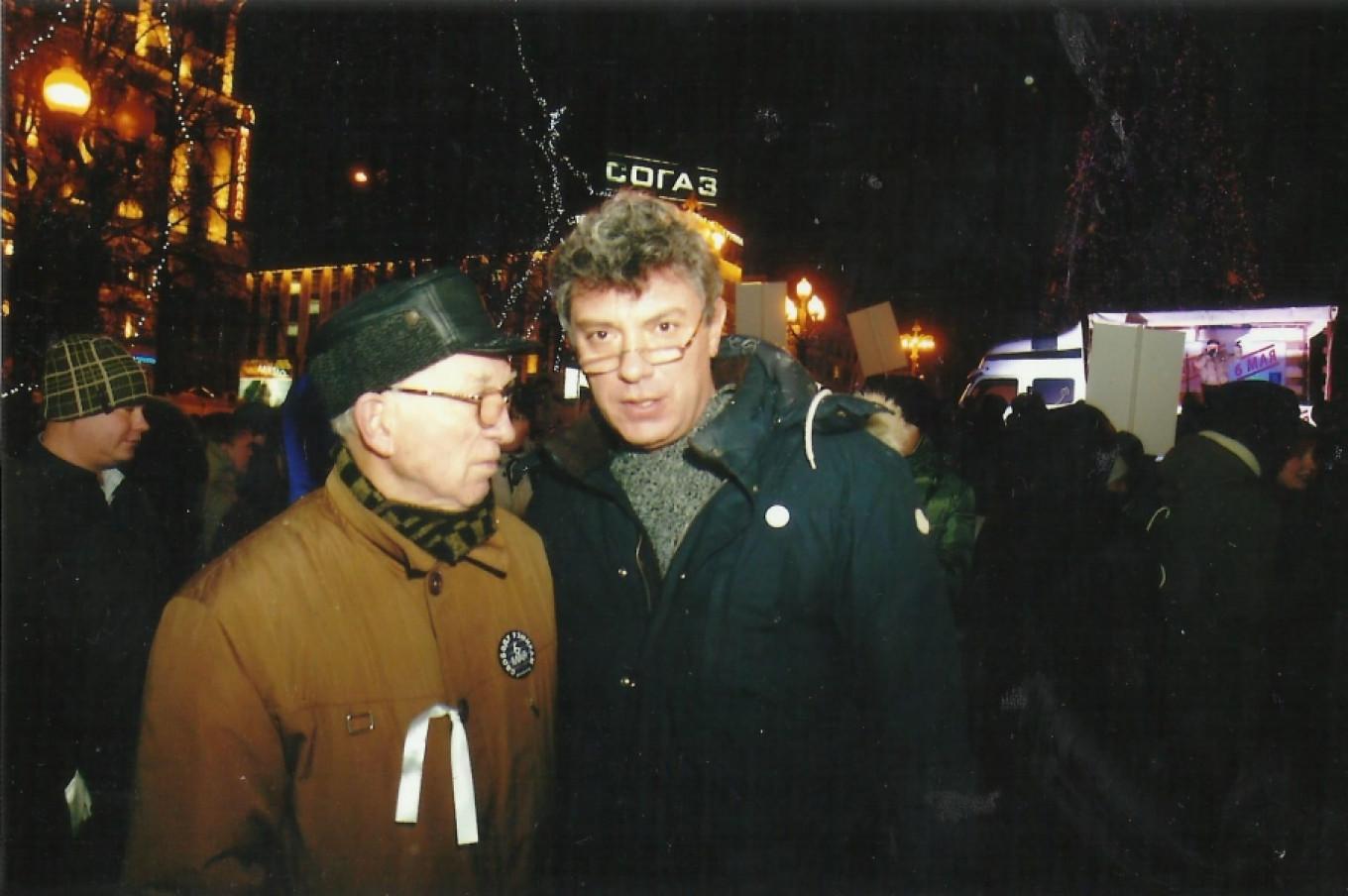
Political Murder
Before his death, Boris Nemtsov had been a staunch critic of Russia's involvement in the Ukrainian conflict. He opposed the annexation of Crimea, and the Kremlin's jingoistic saber-rattling following the overthrow of the pro-Moscow president Viktor Yanukovych.
At the time of his murder, Nemtsov had been working on an investigation into the extent of Russian involvement in eastern Ukraine. This report was published after his death. Five men are currently on trial for the murder, but Nemtsov's supporters argue they were mere trigger-pullers. The evidence, they say, points to Chechnya and its leader Ramzan Kadyrov, who has repeatedly threatened opposition figures on social media.
Despite their differences — they come from all walks of life — the “Nemtsov Bridge” watchmen share much of Nemtsov's liberal world view. But this is not what drives them to protect his memory, they say. Instead, they invoke the politician’s personable nature; his authenticity and charm.
“I was impressed by his openness, his simplicity and goodness, how he drew people in,” says Kogan, a computer technician. “Everything else seemed not to matter and he was completely fearless.”
With the authorities’ refusal to recognize a broader public significance to Nemtsov’s murder, the activists now see themselves as a last line of defense.
“This was a political murder,” says Kozal. “Nemtsov deserves proper recognition.”
Island of Humanity
The bridge has become a central part of the volunteers’ lives. Every day at 23:31, the group meets to hold a minute’s silence — at the exact time Nemtsov was killed.
Some of them are responsible for collecting donations; others for buying flowers. But other than that there are no defined roles. There is no leader or strict hierarchy.
This horizontal structure is what, they say, sets them apart from the rest of Russia. “We’re an island of humanity on a sea of inhumanity,” says Margulyov.
But as attached as they have become to the bridge, the watchmen say they would give it up in an instant were City Hall put up a permanent plaque. No one expects that to happen soon, however.
Fyodorovich, the pensioner, is bracing for many more cold nights on the bridge. Asked where he gets the stamina from, he recites a poem written by a fellow activist in the wake of Nemtsov’s killing:
I'm on the bridge
yesterday it was covered in flowers
but the city has been put at the mercy of vultures,
and someone is injecting fear into this city.
I'm not afraid, they didn't succeed.
I'm here at the very center of emptiness —
Broad bridge, a man shot ...
Yes, it is very easy to throw away flowers.
But it's much more difficult to cover up why they're there.
Listen, you unknown evildoer,
I'm telling you, my face uncovered:
We forbid the killing of people:
by Kadyrov's, or other, bandits.
A Message from The Moscow Times:
Dear readers,
We are facing unprecedented challenges. Russia's Prosecutor General's Office has designated The Moscow Times as an "undesirable" organization, criminalizing our work and putting our staff at risk of prosecution. This follows our earlier unjust labeling as a "foreign agent."
These actions are direct attempts to silence independent journalism in Russia. The authorities claim our work "discredits the decisions of the Russian leadership." We see things differently: we strive to provide accurate, unbiased reporting on Russia.
We, the journalists of The Moscow Times, refuse to be silenced. But to continue our work, we need your help.
Your support, no matter how small, makes a world of difference. If you can, please support us monthly starting from just $2. It's quick to set up, and every contribution makes a significant impact.
By supporting The Moscow Times, you're defending open, independent journalism in the face of repression. Thank you for standing with us.
Remind me later.


